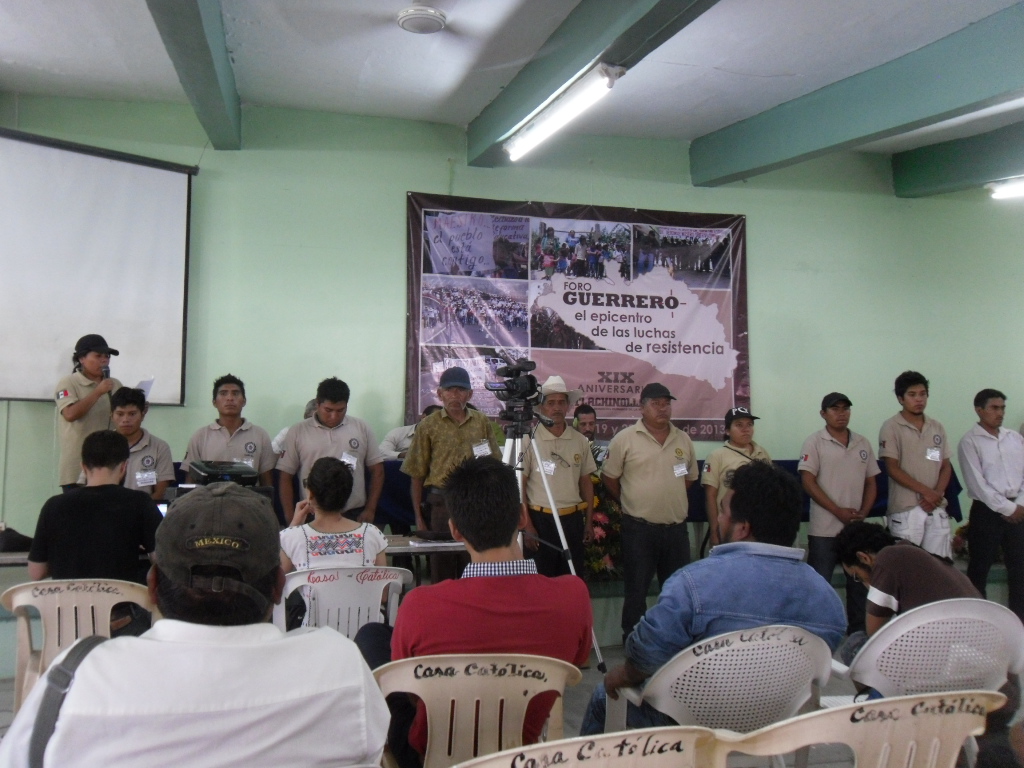
The Tlachinollan Human Rights Center celebrated its 19th anniversary with a gathering in Tlapa de Comonfort on the 19 and 20 July 2013. PBI congratulates the organization and keeps supporting the important work it carries out.
Tlachinollan marked its anniversary with the forum Guerrero: the epicenter of resistance struggles, through which participants debated some of the main issues affecting The Montaña and other regions of the state. Workshops discussed the defense of the territory against the imposition of megaprojects and the lack of proper consultation of the affected communities; indigenous justice and security systems, with the presence of the Coordinadora Regional de Autoridades Comunitarias (Regional Coordination of Community Authorities, CRAC) and the Coordinadora Regional de Seguridad y Justicia – Policía Ciudadana y Popular (Regional Coordination for Security and Justice – Popular and Citizens' Police, CRSJ-PCP); education in Guerrero, with the Coordinadora Estatal de Trabajadores de la Educación de Guerrero (State Coordination of Education Workers of Guerrero, CETEG), students from the Rural Normal de Ayotzinapa and teachers denouncing the education reforms as “simply administrative and not consulted with society or teachers”; the right to water, with interventions by members of the Consejo de Ejidos y Comunidades Opositoras a la Presa La Parota (Ejidos and Communities Opposed to the Parota Dam Council, CECOP) and Radio Ñomndaa.
Closing the forum, Abel Barrera, Tlachinollan's Director, mentioned the “great current of resistance” in Guerrero, exemplified by the indigenous struggle for their rights and natural resources, the activism of students and teachers for better education and community initiatives for justice and security. According to Barrera, “we need to allow this popular strength to run free” in order to create a more just and inclusive state.
During the event, Tlachinollan presented it 19th Annual Report Digna Rebeldía. Guerrero, el epicentro de las luchas de resistencia (Dignified Rebellion. Guerrero, the epicenter of resistance struggles), which documents serious human rights violations in Guerrero and the increase in occurrences compared to the previous period. From June 2012 to May 2013, Tlachinollan received more than a thousand requests for intervention and documented 133 violations, representing a 20% increase compared to June 2011 to May 2012.
2013 also marks the 10th anniversary of PBI's accompaniment to Tlachinollan. Nonetheless, cooperation between the two organizations dates from PBI' exploratory mission to Mexico in 1998.
The Human rights Center reminds that “Tlachinollan carries out its work within a context of structural violence, in which patterns of historically rooted human rights violations persist”. The Center's task is not simple; in addition to the structural violence and serious human rights violations, the state of Guerrero features in different national and international reports as one of the most dangerous states for the defense of human rights.
PBI has witnessed this tough reality faced by Tlachinollan, whose members have suffered death threats, harassment, defamation and even had to temporarily close one of their offices. We have also been present during Tlachinollan's strengthening and many achievements, as the Inter-American Court of Human Rights sentences in favor of Valentina Rosendo Cantú and Inés Fernandez Ortega, as well as the reopening of its offices in Ayutla. During the more than 10 years of collaboration, we have shared tours to Europe, visits to indigenous communities, meetings with authorities, interviews and visits of international delegations to Guerrero. Dozens of international volunteers were witnesses to the strength of Valentina, Inés, the OFPM, Felipe, Maximino… the CECOP, the 5 communities of Tecoanapa, Radio Ñomndaa, the CRAC, the community of Carrizalillo; some of the many individuals and organizations supported by Tlachinollan.
Before attending the event in Tlapa, PBI members met with Executive, Legislative and Judicial state authorities in Chilpancingo, Guerrero's capital. During these meetings PBI reiterated its concern for the security of human rights defenders and activists in Guerrero, especially considering the kidnapping and assassination of members of the Unidad Popular de Iguala (United Iguala's People) in June, underlining the importance of investigations and legal punishment of perpetrators in order to increase the security of human rights defenders. PBI requested the full implementation of the provisional measures and sentences issued by the Inter-American Court of Human Rights and highlighted the importance of effective coordination between the state government and the Federal Interior Ministry for the satisfactory implementation of the Protection Mechanism for Human Rights Defenders and Journalists. PBI expressed hope that the state Congress will soon pass legislation criminalizing torture as a serious violation, taking into account international standards and inputs by civil society.
On this 19th anniversary PBI congratulates Tlachinollan and reminds that their work is fundamental for a more just and democratic Mexico.
“The Montaña region will flourish when justice dwells among the na savi, me’phaa, nauas, nn’anncue and mestizos”.
More information:
Article by Abel Barrera "Guerrero, el epicentro de las resistencias" (Spanish)
Website of the Tlachinollan Human Rights Center
PBI's accompaniment to the Tlachinollan Human Rights Center
